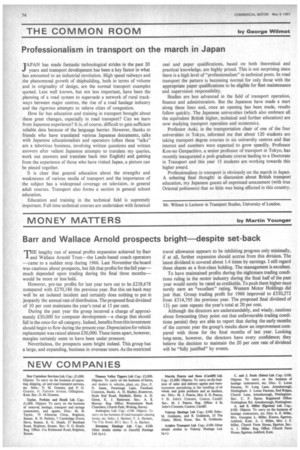Professionalism in transport on the march in Japan
Page 76

If you've noticed an error in this article please click here to report it so we can fix it.
JAPAN has made fantastic technological strides in the past 20 years and transport development has been a key factor in what has amounted to an industrial revolution. High speed railways and the phenomenal growth of shipbuilding, both in terms of volume and in originality of design, are the normal transport examples quoted. Less well known, but not less important, have been the planning of a road system to supersede a network of rural trackways between major centres, the rise of a road haulage industry and the rigorous attempts to relieve cities of congestion.
How far has education and training in transport brought about these great changes, especially in road transport? Can we learn from Japanese experience? It is, of course, difficult to gain sufficient reliable data because of the language barrier. However, thanks to friends who have translated various Japanese documents, talks with Japanese educationalists and operators (often these "talks" are a laborious business, involving written questions and written answers after valiant Japanese attempts to translate my queries, work out answers and translate back into English) and gaining from the experience of those who have visited Japan, a picture can be pieced together.
It is clear that general education about the strengths and weaknesses of various media of transport and the importance of the subject has a widespread coverage on television, in general adult courses. Transport also forms a section in general school education.
Education and training in the technical field is supremely important. Full-time technical courses are undertaken with fanatical zeal and paper qualifications, based on both theoretical and practical knowledge, are highly prized. This is not surprising since there is a high level of "professionalism" in technical posts. In road transport the pattern is becoming normal for only those with the appropriate paper qualifications to be eligible for fleet maintenance and supervision responsibility.
Studies are less advanced in the field of transport operation, finance and administration. But the Japanese have made a start along these lines and, once an opening has been made, results follow quickly. The Japanese universities (which also embrace all the equivalent British higher, technical and further education) are now studying transport operation and economics.
Professor Aoki, in the transportation chair of one of the four universities in Tokyo, informed me that about 120 students are taking transport degree courses in six university centres and that interest and numbers were expected to grow speedily. Professor Kon-no Genpachiro, a senior professor of transport in Tokyo, has recently inaugurated a pot-graduate course leading to a Doctorate in Transport and this year 15 students are working towards this higher award.
Professionalism in transport is obviously on the march in Japan. A sobering final thought in discussion about British transport education, my Japanese guests all expressed amazement (with true Oriental politeness) that so little was being effected in this country.




















































































































